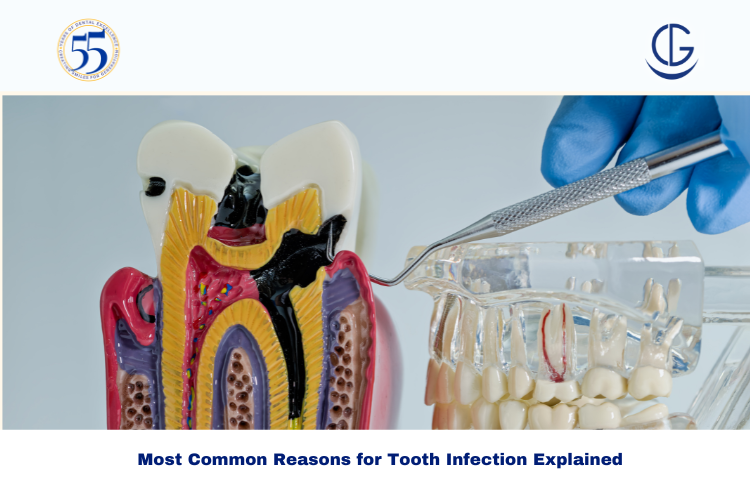Schedule Appointment


A tooth infection is a serious and often painful dental condition that can spread rapidly if not addressed in time. At Dr. Gowds Dental Hospital in Hyderabad, we regularly treat patients who arrive with severe dental infections that could have been prevented with early intervention. Understanding the causes, early warning signs, and treatment options for a tooth infection is essential for maintaining long-term oral health.
If you are experiencing persistent tooth pain or swelling, schedule a consultation at Dr. Gowds Dental Hospital today for timely diagnosis and treatment.
A tooth infection develops when harmful bacteria penetrate the innermost part of the tooth, known as the pulp. The pulp contains nerves and blood vessels, and once bacteria reach this area, it triggers inflammation, pain, and swelling. Over time, the infection may extend to the surrounding gums, jawbone, and even the bloodstream.
Tooth infections do not improve on their own. They require prompt professional treatment to prevent complications and restore oral health.
A detailed look at the primary causes of tooth infection helps patients understand how to prevent this condition.
Dental cavities begin as small areas of decay but progress deeper when left untreated. Once the cavity reaches the pulp, bacteria can invade and cause a tooth infection. This is the most frequent cause seen in everyday dental practice.
Gum disease (periodontitis) occurs when plaque and tartar accumulate around the gums, leading to inflammation and tissue damage. As the disease progresses, it creates pockets around the teeth where bacteria can thrive. These bacteria can eventually access the roots and cause an infection at the base of the tooth.
A crack or fracture exposes the inner layers of the tooth. Even a minor crack caused by biting hard foods, nighttime grinding, or accidental injury can allow bacteria to enter and cause infection.
Old fillings, leaking crowns, or damaged dental restorations create small openings where bacteria can accumulate. Over time, these hidden bacterial colonies can trigger a tooth infection beneath the restoration.
Irregular brushing, flossing, and routine dental check-ups contribute to plaque buildup. This increases the risk of decay, gum disease, and eventually infection. Maintaining proper oral hygiene is one of the simplest ways to prevent dental infections.
Individuals with compromised immunity due to diabetes, autoimmune conditions, or certain medications may be more prone to tooth infections. A weakened immune response allows bacteria to multiply more quickly.
Recognizing the symptoms of tooth infection early can help patients take timely action:
Pain that does not subside, intensifies at night, or radiates to the ear, neck, or jaw is a significant indicator.
Swelling around the affected tooth or in the face suggests that the infection may be spreading.
A sudden reaction to hot or cold foods often indicates nerve involvement.
An infected tooth may produce pus, leading to a metallic taste or chronic bad breath.
Systemic symptoms indicate that the body is attempting to fight the infection.
Pressure on an infected tooth often increases pain and discomfort.
If any of these symptoms develop, consult a dental professional immediately to avoid complications.
The treatment for an infected tooth varies based on the stage and severity of the infection. At Dr. Gowds Dental Hospital, our dentists use advanced diagnostic tools to determine the most effective approach.
A root canal is one of the most reliable methods to save a tooth affected by infection. The procedure involves removing the infected pulp, disinfecting the canals, and sealing the tooth to prevent reinfection.
If gum disease is the cause, scaling and root planing may be required to eliminate bacteria from below the gumline. Antibiotics may be prescribed to help control infection.
In some cases, the infection forms an abscess. Draining the abscess reduces pressure, eases pain, and prevents further spread.
When the tooth cannot be saved due to severe damage, extraction may be the only option. After removal, the tooth can be replaced with an implant, bridge, or other restoration.
For patients seeking prompt tooth pain treatment Hyderabad, same-day emergency appointments are available.
Delaying treatment can lead to serious dental infection complications, including:
Prompt treatment significantly reduces the risk of these complications.
Patients choose Dr. Gowds Dental Hospital for several reasons:
Our commitment to high-quality care ensures that patients receive the best possible outcomes.
A tooth infection is a dental emergency that should be addressed promptly to avoid pain, complications, and long-term damage. Whether you notice early symptoms or are experiencing severe discomfort, seeking timely care is essential. Dr. Gowds Dental Hospital provides comprehensive diagnosis and treatment options supported by experienced specialists and advanced technology. With early intervention, most infected teeth can be saved and restored to full function.
To schedule a consultation or emergency appointment, contact our Hyderabad clinic today. Immediate care ensures faster recovery and prevents complications.
A tooth infection is serious and can spread to the jaw, face, or bloodstream if not treated promptly. Professional intervention is necessary to avoid complications.
With proper treatment such as a root canal or drainage, symptoms typically improve within a few days. Complete healing depends on the severity and treatment approach.
Antibiotics can help control bacterial spread but cannot eliminate the infection inside the tooth. A dental procedure is required to fully remove the source.
Untreated infections can lead to abscesses, bone loss, facial swelling, and widespread infection. In severe cases, hospitalization may be required.
In most cases, yes. A root canal effectively removes infected tissue and saves the natural tooth. It is one of the most reliable long-term solutions for a tooth infection.